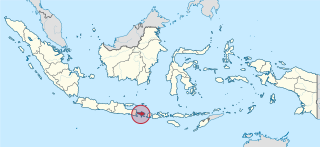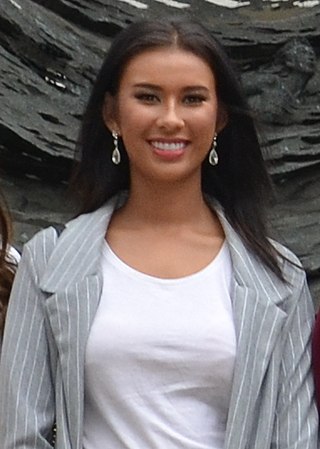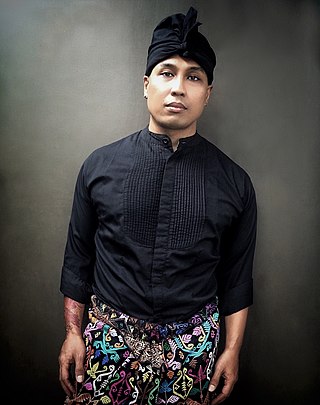Related Research Articles

Bali is a province of Indonesia and the westernmost of the Lesser Sunda Islands. East of Java and west of Lombok, the province includes the island of Bali and a few smaller offshore islands, notably Nusa Penida, Nusa Lembongan, and Nusa Ceningan to the southeast. The provincial capital, Denpasar, is the most populous city in the Lesser Sunda Islands and the second-largest, after Makassar, in Eastern Indonesia. The upland town of Ubud in Greater Denpasar is considered Bali's cultural centre. The province is Indonesia's main tourist destination, with a significant rise in tourism since the 1980s. Tourism-related business makes up 80% of its economy.

Tourism in Indonesia is an important component of the Indonesian economy as well as a significant source of its foreign exchange revenues. Indonesia was ranked at 20th in the world tourist Industry in 2017, also ranked as the ninth-fastest growing tourist sector in the world, the third-fastest growing in Asia and fastest-growing in Southeast Asia. In 2018, Denpasar, Jakarta and Batam are among of 10 cities in the world with fastest growth in tourism, 32.7, 29.2 and 23.3 percent respectively. The tourism sector ranked as the 4th largest among goods and services export sectors.

Ubud is a town on the Indonesian island of Bali in Ubud District, located amongst rice paddies and steep ravines in the central foothills of the Gianyar regency. Promoted as an arts and culture centre, it has developed a large tourism industry. It forms a northern part of the Greater Denpasar metropolitan area.

Hinduism is the third-largest religion in Indonesia, based on civil registration data in 2022 from Ministry of Home Affairs, is practised by about 1.69% of the total population, and almost 87% of the population in Bali. Hinduism was the dominant religion in the country before the arrival of Islam and is one of the six official religions of Indonesia today. Hinduism came to Indonesia in the 1st-century through Indian traders, sailors, scholars and priests. A syncretic fusion of pre-existing Javanese folk religion, culture and Hindu ideas, that from the 6th-century also synthesized Buddhist ideas as well, evolved as the Indonesian version of Hinduism. These ideas continued to develop during the Srivijaya and Majapahit empires. About 1400 CE, these kingdoms were introduced to Islam from coast-based Muslim traders, and thereafter Hinduism, which was previously the dominant religion in the region, mostly vanished from many of the islands of Indonesia.

John Hardy, established in Bali in 1975, creates artisan handcrafted jewelry. Each of John Hardy’s distinctive collections conveys evocative symbolism and honors the transmission of creative energy from the artist to the wearer. Since inception, the company has been deeply rooted in the essential values of community, artisanship, and sustainability.

Sanur is a coastal stretch of beach east of Denpasar in southeast Bali, which has grown into a little town in its own right. A 5.1 km (3.2 mi) area of Sanur's coastline, from Matahari Terbit Beach to Mertasari Beach, was reclaimed in 2008.

Kerobokan is a kelurahan in North Kuta district, Badung Regency, Bali, Indonesia. Kerobokan Prison is located there. It is boxed in by the Seminyak/Oberoi, Umalas/Canggu, and Denpasar regions. Near the main intersection, there is a night market selling local foods and other products.

Jakarta Fashion Week or JFW is a fashion event held annually in Jakarta, Indonesia. JFW is dubbed as the largest fashion event in Southeast Asia. JFW is organized as a collaboration platform between major stakeholders of the fashion and creative industry with the industry actors and community by GCM Group.
Iwan Tirta was an Indonesian batik fashion designer. Tirta trained as a lawyer, but became an internationally known designer. He is credited with beginning the early revival of batik design during the 1970s and 1980s. He also became an Indonesian and Javanese cultural advocate, as well as a food consultant, later in his career.

Karet Bivak is a cemetery in Jakarta, Indonesia. It is the second largest in the city.
Sebastian Gunawan, also known as Seba, is an Indonesian fashion designer. He is known for his designs of ornate evening gowns.
Obin, real name Josephine Komara, is a textile designer from Indonesia. She is sometimes called a "national treasure" due to her passion for and promotion of traditional Indonesian batik techniques. Her work has achieved worldwide recognition, with fellow Indonesian designers such as Edward Hutabarat and Ghea Panggabean describing her as the real authority and leader of the mid-2000s movement to update and modernise batik. Despite this, Obin describes herself as simply a tukang kain, or vendor of cloth, stating that the genuine artists and designers are the craftsmen who make the textiles retailed through Bin House, her business.
Farah Khan is a Singaporean entrepreneur, the founder of the luxury retail fashion boutique Melium Group and the creative director of the Farah Khan label. In 2011, The Star listed her as one of the top 100 memorable women in Malaysia. In 2006, Khan received the Italian Star of Solidarity Order from the Italian Ambassador to Malaysia Alessandro Busacca in conjunction with his country's national day. This award honours foreign personalities who strengthen ties between Italy and foreign countries in terms of culture, language, humanitarian actions.

Indonesia–Panama relations was established on 27 March 1979. Since the beginning, both countries have realized the strategic importance of each counterpart; Indonesia sees the strategic and geographic importance of Panama as their gate to Central America as well as to reach the Caribbean region, while Panama has also recognized the strategic importance of Indonesia in ASEAN. Indonesia has an embassy in Panama City, while Panama has an embassy in Jakarta.

Achintya Holte Nilsen is an Indonesian beauty pageant titleholder who was crowned Miss Indonesia 2017. She represented Indonesia at the Miss World 2017 pageant and finished in the top 10, winning Beauty with a Purpose, Miss World Asia and Best Designer Award.
Elora Hardy is a Canadian designer, who founded the company IBUKU. She is most well known for designing a community of bamboo homes near Denpasar in Bali. She was born in Canada, grew up in Bali and moved to the United States at the age of 14 to go to boarding school. She then got a degree in fine arts and worked in the fashion industry where she most notably designed prints for Donna Karan. In 2010 Hardy moved back to Bali and founded Ibuku, a design firm that uses bamboo and other natural materials to build homes and structures. Since that time Ibuku has built more than 90 bamboo structures in Southeast Asia and Africa, including the Green School Bali campus. Hardy created a yoga pavilion and riverside cooking classroom at the Four Seasons in Bali, the interior design of Tri restaurant in Hong Kong, furniture for the Como Marketplace in Singapore and tree-house suites at Bambu Indah.

Natasha Mannuela Halim is an Indonesian model, ballerina, fashion designer, architecture contractor and beauty pageant titleholder who was crowned Miss Indonesia 2016, she represented Indonesia at the Miss World 2016, where she was crowned 2nd Runner-up and Miss World Asia 2016, the highest placement for Indonesia so far.

Sabbatha Rahzuardi or known as Sabbatha. Sabbatha is a former Indonesian fashion accessories designer. Raised in a family of artists, Sabbatha started his career in 2005 as a fashion designer for accessories and handbags namely Sabbatha. Since 2016 until today, Sabbatha is more as an origami visual 3D art and interior design decoration, with Sabbatha Origami.

Laksmi Shari De-Neefe Suardana, simply known as Laksmi De-Neefe Suardana, is an Indonesian fashion designer, author, UNICEF activist, 2022 G20 Ambassador, co-founder of Ubud Writers and Readers Festival, model and beauty pageant titleholder who was crowned Puteri Indonesia 2022. Suardana is the first representative from Bali to be crowned Puteri Indonesia. She represented Indonesia at Miss Universe 2022.

Mutiara "Tia" Annisa Baswedan is an Indonesian lawyer, educator, and model.
References
- ↑ "The 'Made in Indonesia' Opportunity". The Business of Fashion. 2017-11-14. Retrieved 2019-11-05.
- ↑ "Feminista! • The Yak Online". The Yak Online. 2019-08-30. Retrieved 2019-11-05.
- ↑ Royo, Alessandra Lopez y (2019-10-31). Contemporary Indonesian Fashion: Through the Looking Glass. Bloomsbury Publishing. ISBN 9781350061316.
- ↑ Ellwood, Mark (2018-10-25). "On Bali, a Retail Scene That's Equal Parts Varied and Vibrant". The New York Times. ISSN 0362-4331 . Retrieved 2019-11-05.
- ↑ "Biasa Art Gallery Jakarta - One of The Best Activities in Jakarta". jktgo.com. Retrieved 2019-11-05.
- ↑ Dharma, Annisa (2016-02-23). "A Life Less Ordinary". Annisa Dharma, copywriter & content strategist. Retrieved 2019-11-05.
- ↑ "EMMEOTTO". www.emmeotto.net. Retrieved 2020-01-10.